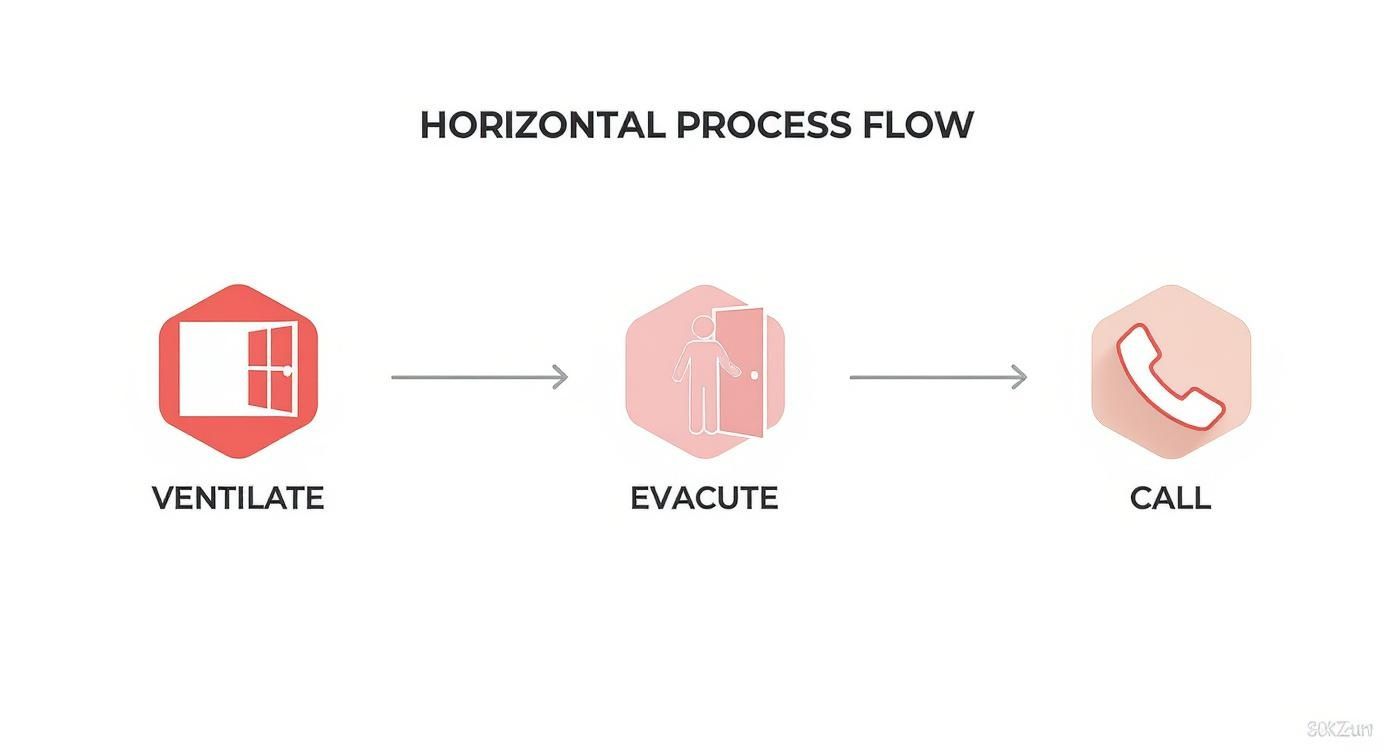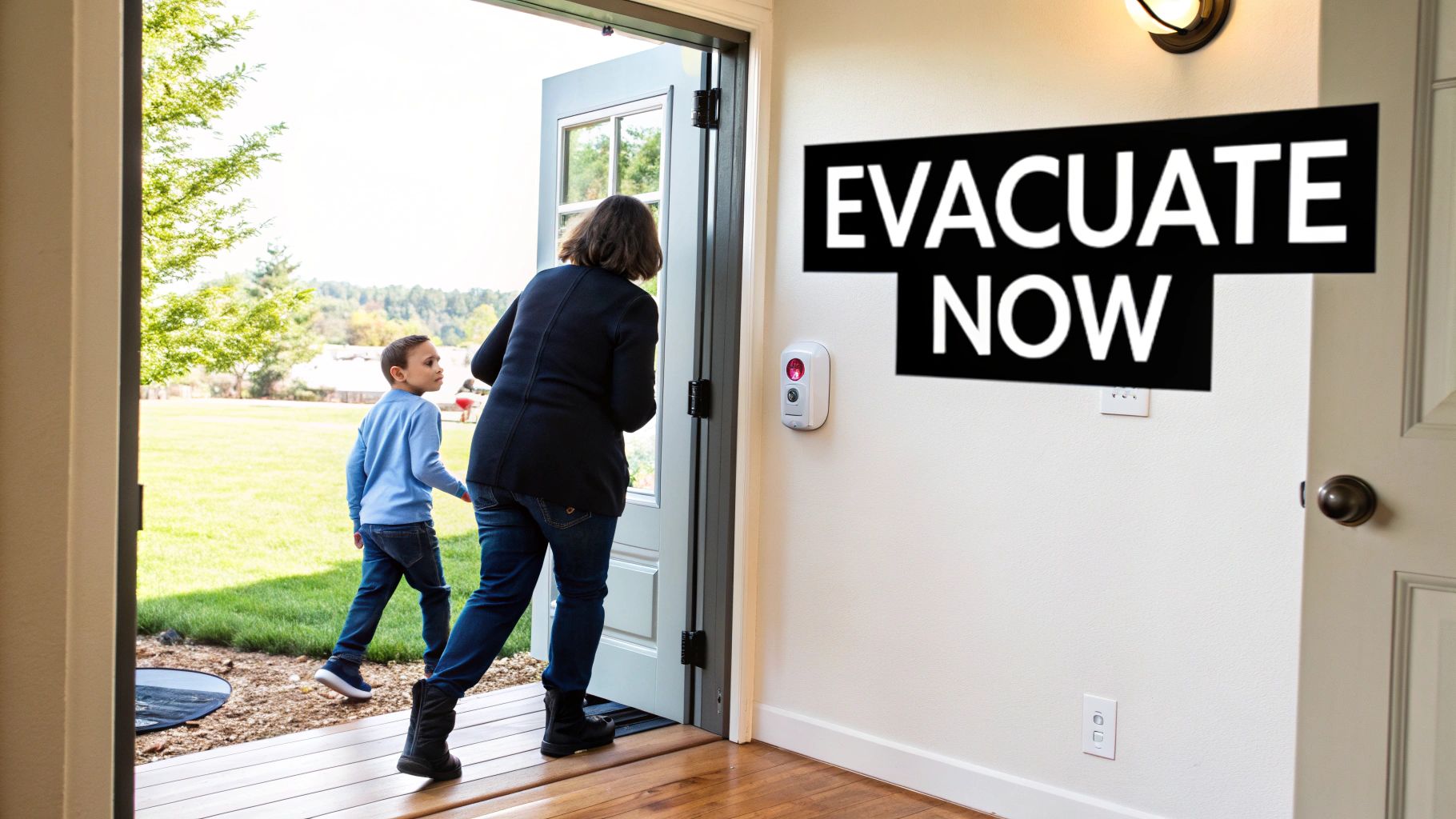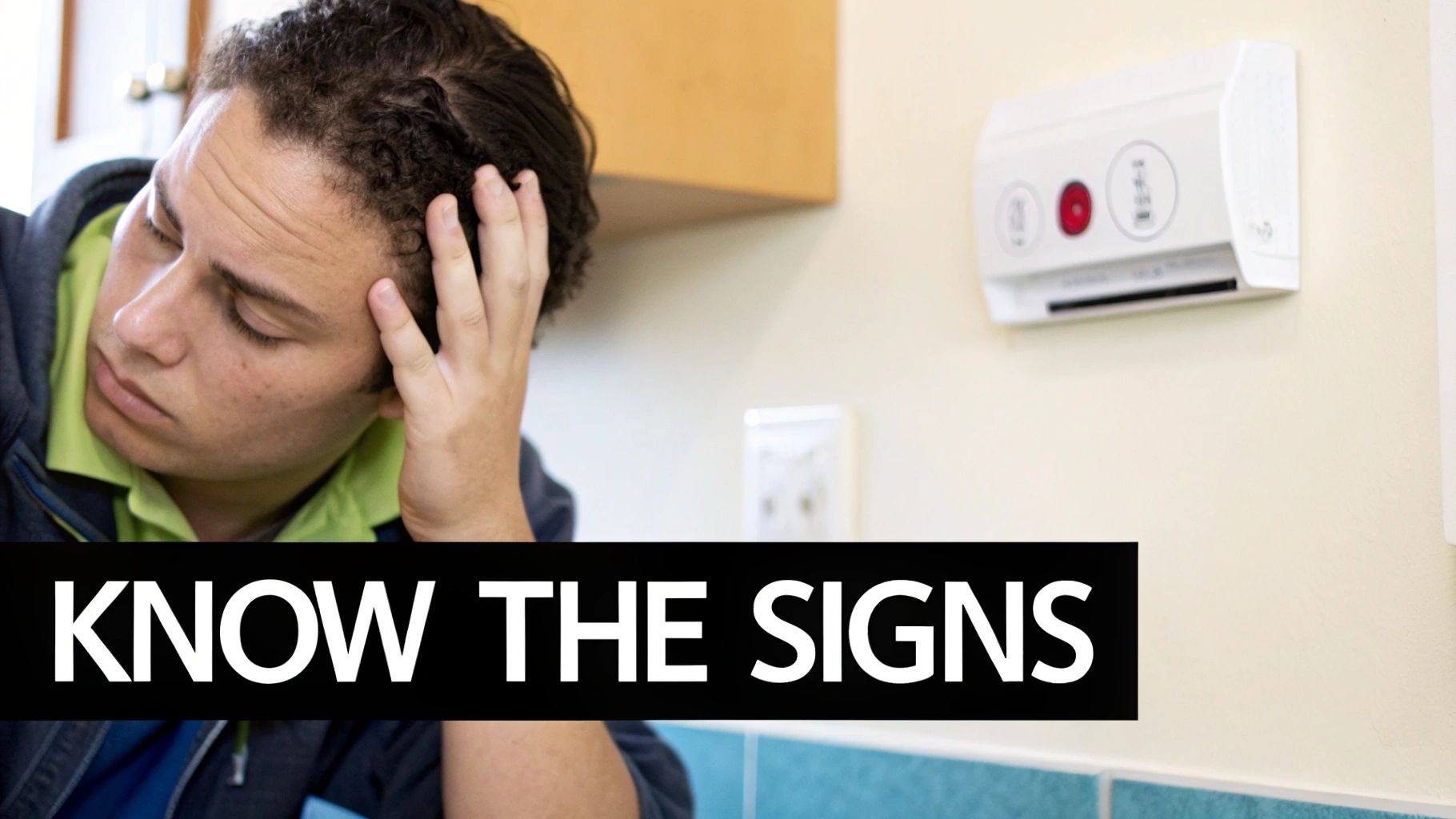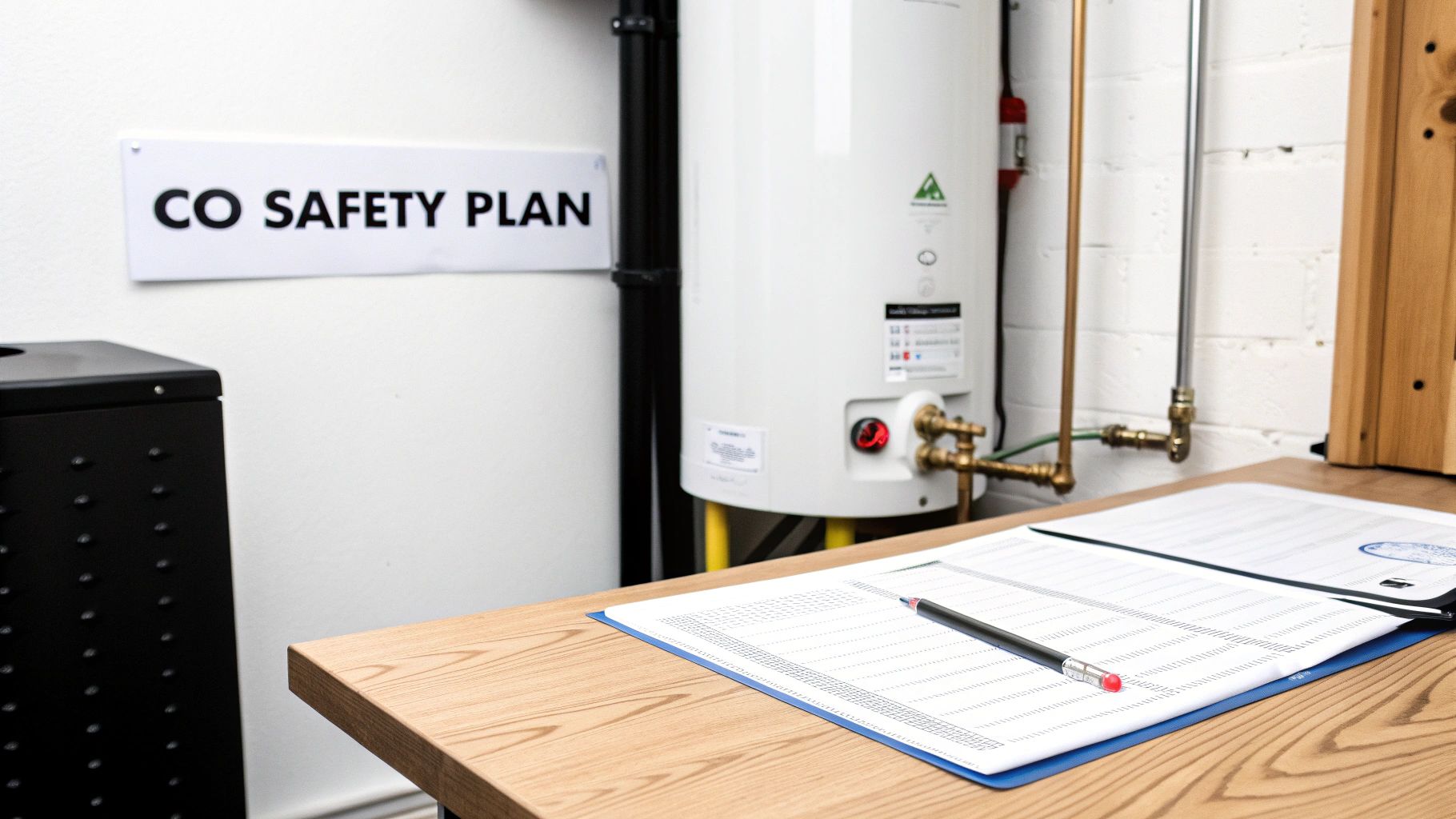carbon monoxide alarm is going off? Here's what to do
- Luke Yeates
- Oct 28, 2025
- 13 min read
When your carbon monoxide alarm goes off, the last thing you should do is panic. But you absolutely must act fast. Your first priority is simple: get fresh air into the property by opening every door and window you can, switch off appliances like boilers or gas fires, and get everyone outside immediately.
Your Immediate Action Plan for a CO Alarm
That piercing shriek from a CO alarm is designed to cut through everything and grab your attention. There's a good reason for it—your safety is at risk. Carbon monoxide (CO) is completely invisible and has no smell or taste, which is why your alarm is the only thing standing between you and potential danger. Knowing exactly what to do in those first few moments can make all the difference.
This flowchart breaks down the essential, non-negotiable steps you need to take.

As the visual guide shows, the sequence is straightforward: ventilate the space, get everyone out, and then call for help. Prioritising your safe exit over everything else is key.
For a quick reference, here’s a simple checklist to keep in mind.
Immediate Action Checklist for a Sounding CO Alarm
This table provides a quick, scannable guide to the crucial first steps for ensuring immediate safety when your carbon monoxide alarm is activated.
Action Step | Why This Is Critical |
|---|---|
Open Doors & Windows | Immediately introduces fresh air to dilute the concentration of CO gas inside your home. |
Turn Off Appliances | If safe, switching off fuel-burning appliances (boiler, gas fire) helps stop the source of the leak. |
Evacuate Everyone | Get all people and pets out of the property into fresh air without delay. |
Stay Outside | Do not re-enter the home until it has been declared safe by a professional. |
Call for Help | Dial 999 if anyone feels unwell; otherwise, call a Gas Safe engineer. |
Following these steps methodically will help you manage the situation safely and effectively.
Do Not Re-Enter Your Property
Once everyone—including your pets—is safely outside, you must stay out. It’s incredibly tempting to pop back in for a phone or your keys, but that could be a fatal mistake. The CO levels inside could still be dangerously high, and you might not even feel the effects until it’s too late.
Remember, material things can always be replaced, but lives cannot. The single most important thing you can do is get out and stay out until a professional has given the all-clear.
Turning Off Appliances and Ventilating
If you can do it quickly and without putting yourself at risk on your way out, shut down all fuel-burning appliances. This typically includes your:
Gas boiler and central heating system
Gas hob or cooker
Gas fire in the living room
At the same time, throw open as many windows and doors as you can. Creating a through-draught helps to disperse the dangerous gas, but this is just a temporary fix, not a solution. The source of the carbon monoxide must be found and properly repaired.
Knowing Who to Call First
What you do next depends entirely on how everyone is feeling. If anyone feels unwell—complaining of headaches, dizziness, or nausea—your first and only call should be to 999 for an ambulance. Make sure you tell them you suspect carbon monoxide poisoning.
After you've addressed everyone's health, your next call should be to a qualified Gas Safe registered engineer. For homeowners in Eastbourne and the surrounding areas, a call to Harrlie Plumbing and Heating will connect you with a certified professional who can safely find the source of the problem. Accidental CO poisoning is a very real threat; official research shows there are around 60 deaths annually in England and Wales from this silent killer. You can read the full research about carbon monoxide poisoning statistics in the UK to better understand the risks. It’s an engineer’s job to find the fault and make your home safe again.
Recognising The Symptoms Of CO Poisoning
When your carbon monoxide alarm is going off, it’s a direct warning about a threat you can't see, smell, or taste. Unlike smoke, CO gas is completely undetectable by your senses, but its impact on the human body is incredibly fast and dangerous. The initial signs are often subtle and frighteningly easy to brush off, which is why knowing what to look for is so important.

So many people mistake the early stages of CO poisoning for a simple case of the flu. It’s an easy mistake to make—the symptoms overlap almost perfectly. You can easily picture an Eastbourne family feeling a bit under the weather during a cold snap. They might put their headaches and tiredness down to another winter bug doing the rounds at school or the office.
This is a real-world scenario we at Harrlie Plumbing and Heating have unfortunately heard about before. A family feels unwell for a few days, only connecting the dots when their alarm finally shrieks. That link between feeling ill and the alarm’s warning is the crucial piece of the puzzle you can't afford to miss.
The Six Key Warning Signs
If your alarm is sounding, you need to immediately check how everyone in the house is feeling. The presence of any physical symptoms escalates the situation into a full-blown medical emergency.
Here are the six main signs to look out for:
Dull Headaches: This is the most common early symptom. It's often described as a constant, throbbing headache, almost like a tension headache that won't go away.
Dizziness or Light-headedness: You might feel wobbly and unsteady on your feet or get a sudden sensation of the room spinning.
Nausea and Vomiting: Feeling sick to your stomach is another classic sign that’s frequently confused with food poisoning or a stomach bug.
Shortness of Breath: You may find it hard to catch your breath, even if you’re just sitting down and resting.
Confusion or Brain Fog: CO exposure can mess with your thinking, making you feel disorientated, muddled, or unable to concentrate.
Collapsing or Loss of Consciousness: In severe cases, the exposure can cause someone to faint. This is an undeniable sign of a life-threatening emergency.
If anyone in your home is showing any of these symptoms while the alarm is active, you must seek immediate medical attention by calling 999. Do not wait. Make sure you tell the operator that your CO alarm is sounding and you suspect carbon monoxide poisoning.
Why Symptoms Can Affect People Differently
It’s also really important to understand that not everyone will react to CO in the same way. Children, the elderly, and anyone with chronic heart or breathing conditions are often hit harder and faster.
Because of this, one person might feel extremely dizzy while another just has a mild headache. If your carbon monoxide alarm is going off and even one person feels unwell, you have to treat it as a worst-case scenario for the entire household.
Your alarm is the definitive alert. The symptoms are the confirmation that you need to act right now, without a moment's hesitation. Getting everyone out into the fresh air and calling for medical help is the only safe response.
Identifying Common Causes For A CO Alarm
Once everyone is safely outside and you’ve made the emergency calls, your mind will naturally start racing: what on earth caused that? When a carbon monoxide alarm is going off, it’s detecting a genuine threat. Pinpointing the source is the next critical step. The causes are almost always linked to the incomplete combustion of fuel from an appliance in your home.

In our experience across Eastbourne, the most frequent culprits are faulty or poorly maintained fuel-burning appliances. These are the everyday items you rely on for warmth and cooking. For example, a family in a Victorian terrace house in the Old Town area might have an older boiler that hasn't been serviced, which can be a common source of problems.
An appliance that isn't burning its fuel correctly—be it gas, oil, wood, or coal—will start producing carbon monoxide. This is exactly why annual servicing is so important; it’s not just about efficiency, it’s about keeping your family safe.
Faulty Appliances and Poor Maintenance
The most common sources of CO leaks inside a home are devices that have developed a fault or simply haven't been professionally checked in a while. Think about the workhorses of your home:
Boilers: A boiler with a fault, incorrect installation, or poor maintenance is a primary suspect for a CO leak.
Gas Fires: Older or improperly serviced gas fires can produce dangerous levels of carbon monoxide.
Gas Cookers and Hobs: If the flame on your gas hob is yellow or orange instead of a crisp blue, that's a tell-tale sign of incomplete combustion.
Wood Burners and Open Fires: These are lovely additions to a home but need a clear flue to function safely.
We often see issues arise from simple neglect. A boiler that hasn't been serviced for a few years, for instance, can develop blockages or faults that lead directly to a CO leak. Knowing how to spot potential issues early is vital, and you can find more information in our guide on how to detect gas leaks in your home.
Blocked Flues and Chimneys
Even a perfectly functioning appliance can become deadly if its ventilation path is blocked. Flues, vents, and chimneys are designed to carry exhaust gases safely outside. If they get blocked, those gases have nowhere to go but back into your room.
Here in Eastbourne, the coastal weather can be a surprising factor. Strong winds can dislodge birds' nests, leaves, and other debris, which then fall into chimneys and block them completely. This is why regular professional checks by a company like Harrlie Plumbing and Heating are essential to ensure everything is clear.
A blocked chimney turns your entire room into a potential gas chamber. It’s a silent, invisible problem that only a CO alarm or a professional inspection can reliably detect before it's too late.
Less Obvious Household Hazards
While appliances are the usual suspects, some causes of a CO alarm activation are less obvious and relate more to household habits. These are situations you might not even realise are dangerous.
Consider these scenarios:
Running a car, motorbike, or even a petrol lawnmower in an attached garage. Fumes can easily seep into the main house.
Using a barbecue (charcoal or gas) in a sheltered area too close to an open door or window.
Running portable generators or fuel-powered heaters indoors or in an attached outbuilding.
These external sources can trigger an alarm just as easily as a faulty boiler. Understanding all potential hazards helps build a complete picture of home safety.
What A Gas Safe Engineer Will Do
Once you’ve called a professional, you can breathe a sigh of relief, but the job isn't done yet. A qualified Gas Safe registered engineer is your partner in making your home safe again. Knowing what they do when they arrive at your Eastbourne property can take the mystery out of the process and give you confidence that everything is being handled correctly.
When a carbon monoxide alarm is going off, it’s a clear sign that a fuel-burning appliance in your home has a serious problem. In the UK, it's a legal requirement that only a Gas Safe registered engineer works on any gas appliance. This isn't just red tape; it's a crucial safety law designed to protect you from unqualified work that could have devastating consequences.
The Inspection Process
The first thing an engineer from Harrlie Plumbing and Heating will do is make sure the area is safe to enter. Once they've got the all-clear, they'll start a methodical investigation to pinpoint the exact source of the CO leak. This isn’t guesswork—it's a technical process using specialised, calibrated equipment.
A key piece of their kit is a flue gas analyser. This device measures the gases coming from your appliances, including CO levels, to check they are operating within safe limits. Think of it as a diagnostic tool for your boiler or gas fire, giving a precise reading of its health.
An engineer’s job is to be a detective. They systematically check every potential culprit, from the boiler in your utility room to the gas fire in the lounge, ruling things out until the source of the danger is found.
Their inspection is incredibly thorough and covers several key areas. They'll conduct a comprehensive check of:
All fuel-burning appliances: This includes boilers, gas hobs, water heaters, and fires. They'll look for signs of incorrect combustion, like soot stains or lazy, yellow flames instead of crisp blue ones.
Ventilation: They will check that there’s enough airflow around your appliances. Poor ventilation can starve an appliance of oxygen, which is a common cause of CO production.
Flues and Chimneys: The engineer will inspect the flue pipes and chimneys that are meant to carry exhaust gases safely outside, checking for any blockages or damage.
Finding and Fixing the Fault
After identifying the source, the engineer will explain the problem to you in plain English. In a situation where a carbon monoxide alarm is going off, the solution could be anything from a simple repair to recommending that an old, unsafe appliance be replaced. For a deeper dive into what these checks involve, our article explains what a gas safety check involves.
They will immediately isolate the faulty appliance to make it safe, carry out the necessary repairs, and then re-test everything to confirm the CO leak is completely gone. Only when their analyser shows zero readings and they are 100% satisfied that your home is safe will they give you the all-clear. This meticulous process ensures the problem is fixed at its root, giving you complete peace of mind.
Preventing Future Carbon Monoxide Emergencies
True home safety isn’t just about reacting when a carbon monoxide alarm is going off; it's about being proactive to stop it from ever happening again. Once the immediate danger has passed and you've had your home declared safe, the next step is prevention. A simple, consistent maintenance plan is your best defence against future CO risks.
For any homeowner in Eastbourne, this really starts with your boiler. An annual boiler service isn't just a "nice-to-have"—it's arguably the single most important preventative step you can take. A certified engineer, like one from our team at Harrlie Plumbing and Heating, will give your system a thorough inspection, clean key components, and spot potential faults long before they can turn into a dangerous CO leak. This yearly check-up keeps your system running efficiently and, most importantly, safely.
Your Proactive Maintenance Checklist
Beyond the boiler service, a few other key habits will dramatically lower your risk. Think of it as a basic safety checklist for your property.
Schedule Annual Appliance Servicing: It’s not just the boiler. Every fuel-burning appliance, from gas fires to cookers, needs to be checked each year by a Gas Safe registered engineer.
Keep Chimneys and Flues Clear: Make sure to arrange for a professional sweep at least once a year, especially before you start using the fireplace in winter. This is vital in Eastbourne, where windy conditions can cause debris build-up.
Ensure Proper Airflow: Never, ever block vents or air bricks. Your appliances need a steady supply of oxygen to burn fuel cleanly and safely.
Following these steps creates a strong first line of defence. For landlords, these duties are also a legal requirement. We've detailed everything you need to know in our guide on how to get a gas safety certificate in the UK.
Prevention is an ongoing commitment, not a one-time fix. Regular maintenance and mindful habits are the cornerstones of a truly safe home environment.
Managing Your CO Alarms Effectively
Your CO alarm is like an electronic watchdog, but even the best watchdog needs a bit of care to do its job right. Proper alarm management is just as crucial as appliance maintenance.
First, double-check where they are placed. You should have alarms in each room with a fuel-burning appliance and at least one on every level of your home. Just be sure to keep them away from kitchens or steamy bathrooms to avoid frustrating false alarms.
Next, get into the habit of testing every alarm monthly. All it takes is a push of the 'test' button, a simple task that takes just a few seconds but could save a life.
Finally, always pay attention to the expiry date printed on the unit itself. Most CO alarms have a lifespan of 5 to 10 years. After that, the sensor starts to lose its reliability. When you install a new one, mark the replacement date on your calendar so your home is never left unprotected. For a broader look at home safety, you can explore some more general simple steps to improve home security.
Your CO Alarm Questions Answered
Once the initial panic has subsided, it's completely normal to have lingering questions about why your carbon monoxide alarm went off in the first place and how to manage the detectors themselves. Getting clear, straightforward answers is the key to feeling safe and secure in your home again. Let's walk through some of the most common queries we hear from homeowners across Eastbourne.

We often get calls at Harrlie Plumbing and Heating from residents who are confused about the different sounds their alarms make. Knowing what these signals mean ensures you can react the right way, without any unnecessary panic.
My Alarm Is Chirping, Not Giving a Full Alarm
This is a really common point of confusion. A full-throated, continuous siren is an emergency signal—it means dangerous levels of CO have been detected. An intermittent chirp, however, is usually a maintenance alert.
Think of it as the alarm's way of telling you it needs a bit of attention. More often than not, a single chirp every 30 to 60 seconds means the batteries are low and need to be replaced right away.
That chirp could also be signalling that the alarm has reached its "end-of-life." Most CO detectors have a lifespan of 5 to 10 years, and after that, the internal sensor just isn't reliable anymore. While it's not a CO emergency, you must sort the issue immediately to make sure your home stays protected.
Can I Just Open a Window and Reset It?
In a word: no. Silencing the alarm without finding and fixing the source of the CO is incredibly dangerous. While opening windows is a great first step to ventilate the area, the appliance that produced the carbon monoxide is still faulty.
As soon as you shut those windows, the poisonous gas will simply start to build up again. The only truly safe thing to do is to get everyone out, call a Gas Safe engineer (like our team at Harrlie Plumbing and Heating), and wait for them to give the all-clear. Treating the alarm as the problem, rather than the life-saving warning it is, puts everyone in serious danger.
Resetting the alarm is like hitting the snooze button on a fire alarm. You’re ignoring the warning, not solving the underlying problem that triggered it in the first place.
How Many Alarms Do I Need in My Home?
UK regulations are clear: you must have a CO alarm in any room with a solid fuel-burning appliance, such as a wood-burning stove. For total peace of mind, though, safety experts recommend installing an alarm on each level of your home.
Best practice is to put an alarm in every room that contains any fuel-burning appliance, including gas boilers, fires, and water heaters. Here are a few key placement tips from the pros:
Position alarms on a wall at head height, or on a shelf.
Make sure they are between 1 and 3 metres away from the potential CO source.
Always have one near your sleeping areas to ensure you hear it at night.
Try to avoid installing them right next to cookers, in humid spots like bathrooms, or too close to vents and windows. These locations can trigger false alarms or reduce the detector's effectiveness.
If you’re in Eastbourne or the surrounding areas and have concerns about your gas appliances or need a new carbon monoxide alarm fitted, trust the local experts. Contact Harrlie Plumbing and Heating today for a professional safety check and complete peace of mind.

Comments